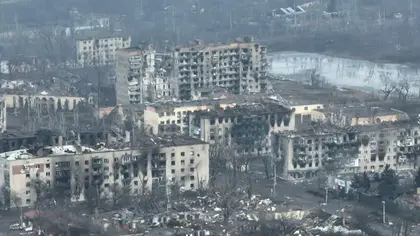Despite already being the scene of the fiercest fighting of the war for months now, the battle for Bakhmut reached an “unprecedented” level over the weekend, a senior Ukrainian official has said.
Serhiy Cherevaty, spokesperson for the Eastern Task Force of the Armed Forces of Ukraine (AFU), said Russian troops were attacking Ukrainian positions with “satanic zeal.”
JOIN US ON TELEGRAM
Follow our coverage of the war on the @Kyivpost_official.
What’s behind the renewed attacks by Russia?
According to western analysts, the appointment of General Colonel Mikhail Teplinsky as commander of Russia’s corps of airborne troops (VDV) is a key factor in the uptick in fighting for Bakhmut.
Previously dismissed from a commanding role in January 2023, he appears to have returned to a major role in Ukraine and in recent days, the VDV has resumed a key mission in the battle for Bakhmut.
According to the Institute for the Study of War (ISW), Teplinsky’s reappointment is likely an “attempt by the Russian Ministry of Defense (MoD) to posture itself better to work with Wagner to finish the task of taking Bakhmut.”
The ISW added: “The Russian MoD and [Wagner Head Yevgeny] Prigozhin publicly acknowledged on April 11 that VDV elements are engaged in the Bakhmut area and holding Wagner’s flanks north and south of the city while Wagner pursues the main offensive effort in the city itself.”

Zelensky Meets CIA Director William Burns in Ukraine
Russian troops – largely Wagner mercenary fighters until recently – have been battling since last summer to capture the town in eastern Ukraine, which has taken on huge symbolic importance even though analysts say it has little strategic value.
Kyiv has said the battle for the town is key to holding back Russian forces along the entire eastern front, leading to a protracted and hugely bloody battle for the city.
Are Russia’s tactics working?
Russia said on Sunday that Wagner mercenary units supported by VDV troops had captured a further two city blocks in Bakhmut, though the claim has not been independently verified.
“Wagner assault units have successfully advanced, capturing two districts on the northern and southern outskirts of the city,” Russia's defense ministry said in a briefing.
According to the ministry, Ukrainian troops “while retreating, are deliberately destroying city infrastructure and residential buildings in order to slow the advance” of Moscow's forces.
What is Ukraine saying?
Ukrainian military officials have acknowledged an increase in the ferocity of the fighting but insist its forces are still holding out.
“The enemy continued to attack our positions with satanic zeal,” Cherevaty said on Saturday, adding: “Today, directly in the urban area of Bakhmut, bloody battles unprecedented in recent decades are taking place.
“Our soldiers in bloody fierce battles are doing everything to wear down the enemy's combat capability and knock out its strength and morale. And every day they are successfully doing this in each corner of this city, trying to inflict maximum damage on the enemy.”
Cherevaty said a total of 17 clashes had occurred, but Russia had taken heavy losses including an unspecified number of “their newest T-90 tank and infantry fighting vehicles”.
“Bakhmut has become a point of infamy for the Russian troops,” Cherevaty said, adding that Russia’s failure to take the city so far was “a shame that they will never be able to wash off.”
What’s happening on the ground?
Russia said on Friday that it was pushing to take the western districts of the heavily destroyed salt mining town. On Thursday, Moscow claimed to have cut off Ukrainian forces in Bakhmut. Kyiv denied the claim, saying it had access to its troops and was able to send in munitions.
AFP journalists moving towards a frontline position near Bakhmut saw Ukrainian troops dislodging their mud-stuck transport by hand.
Watching over that very same battlefield from footage streamed by drones over the trenches, 42-year-old battalion commander Evgeny sees an assault as part of the wider expected Ukrainian counteroffensive as inevitable.
“It's going to happen. Clearly. The situation on the frontline dictates that. But a counter-offensive can only happen when the enemy's forces are exhausted,” he explained to AFP.
He said that even over the weeks his troops have been tasked with containing Russian forces from advancing around Bakhmut's flanks, the attackers were losing steam.
“We have to grind them down so they can't relocate their forces,” he said, describing in detail how Russian forces send waves of dispensable, then more experienced fighters, towards his trenches.
Based on intercepted radio communications and footage that his drones feed back to the bunker, he believes Russian forces – still pushing deeper inside Bakhmut – are ultimately preparing for Ukraine to attack too.
“The enemy has started to lay mines along sections of their lines, which means they are tired. They’re preparing to defend,” he said. That was a sentiment echoed this week by Russian mercenary chief Yevgeny Prigozhin whose fighting force, Wagner, has been spearheading the assault for Bakhmut.
“The ideal option would be to announce the end of the conflict and to tell everyone that Russia has achieved its objective, and in a sense, we have really achieved them,” Prigozhin said in a post on social media.
“Now only one thing remains: to gain a firm foothold and dig into the territories that we already control,” the 61-year-old Kremlin ally said.
You can also highlight the text and press Ctrl + Enter






